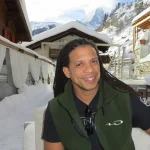At eight years old, Adam Beach stood in a ditch beside his family’s house on the Dog Creek First Nation Reserve, witnessing a tragedy that would reshape his life forever. The drunk driver who killed his pregnant mother that day could never have imagined that this devastating moment would forge one of Canada’s most influential Indigenous actors. Adam Beach is a Canadian actor of Saulteaux First Nations descent, widely recognized for his roles in films such as Smoke Signals and Flags of Our Fathers. Today, more than three decades later, Beach has transformed personal loss into powerful storytelling, becoming a bridge between Indigenous communities and mainstream Hollywood while advocating for authentic Native representation worldwide.
Essential Facts About Adam Beach
| Attribute | Value |
|---|---|
| Full Name | Adam Reuben Beach |
| Born (Age) | November 11, 1972 (52 as of 2025) |
| Nationality | Canadian |
| Ethnicity | Saulteaux (Plains Ojibwe) Anishinaabe |
| Birthplace | Ashern, Manitoba, Canada |
| Occupation | Actor, Motivational Speaker, Advocate |
| Active Years | 1990–Present |
| Notable For | Smoke Signals, Flags of Our Fathers, Arctic Air, Law & Order: SVU |
| Parents | Sally Beach and Dennis Beach |
| Children | 2 children (Noah, Phoenix) |
| Current Spouse | Summer Tiger (married 2015); previously married to Meredith Porter (1999-2002) and Tara Mason (2003-2007) |
| Estimated Net Worth | Net worth is publicly estimated but not officially confirmed |
| Key Affiliations | Adam Beach Film Institute, First Nations youth advocacy |
Early Life: Surviving Unimaginable Loss in Manitoba
Where is Adam Beach from? Born in Ashern, Manitoba, Canada, Adam Beach belongs to the Saulteaux (Plains Ojibwe) nation. He spent his early childhood on the Dog Creek First Nation Reserve at Lake Manitoba with his parents, Sally and Dennis Beach, and two brothers. Beach’s heritage includes Icelandic roots through his great-grandmother, reflecting the complex cultural blend that defines many Indigenous Canadian families.
What happened to Adam Beach’s parents? The defining moment of Beach’s childhood occurred when he was eight years old. His mother, Sally Beach, eight months pregnant with a baby girl, was killed by a drunk driver. Eight weeks later, the family discovered their father Dennis Beach had drowned near their community. Whether Dennis’s death was accidental or intentional remains unclear, but the double loss devastated the family.
Following their parents’ deaths, Adam and his two brothers lived with their grandmother from ages 8 to 12. The boys then moved to Winnipeg to live with their paternal uncle Chris Beach and his wife Agnes. Adam considers Uncle Chris his father figure, referring to him as “Dad” throughout his life.
Finding Purpose Through Performance
In Winnipeg, Beach discovered acting at Gordon Bell High School during drama classes. This creative outlet became his emotional refuge and method for processing trauma. He performed in local theatre productions and eventually left school to pursue a lead role at the Manitoba Theatre for Young People. At 18, Beach landed his first professional role in the miniseries Lost in the Barrens, based on Farley Mowat’s novel.
From Winnipeg Stages to Canadian Film
Beach’s transition from amateur theatre to professional acting began during his teenage years in Winnipeg. His early work at the Manitoba Theatre for Young People provided crucial training in performance and storytelling techniques that would define his later career.
His television debut came with Lost in the Barrens (1990), followed by appearances on popular Canadian productions. Beach quickly became a regular on CBC’s North of 60, a groundbreaking series that portrayed contemporary Indigenous life in Canada’s Northwest Territories. This role provided him with steady work and exposure to Indigenous-centered storytelling, establishing the foundation for his later international success.
The experience on North of 60 proved invaluable, as Beach learned to navigate both Indigenous and mainstream Canadian television production. His work on The Rez further solidified his reputation as a reliable and talented Indigenous actor within Canada’s entertainment industry.
Cultural Impact Note
Beach’s early embrace of acting as healing demonstrates a traditional Indigenous approach to storytelling as medicine. His commitment to drawing from personal experience for authentic performances has influenced how Indigenous trauma is portrayed in contemporary cinema.
Career Milestones: Building Authentic Indigenous Representation
Television Beginnings and First Recognition
Beach’s professional breakthrough came with his role as Frank Fencepost in Bruce McDonald’s Dance Me Outside (1994). This performance earned him an American Indian Film Festival Award for best actor, marking his emergence as a significant talent in Indigenous cinema. The film’s success opened doors to larger opportunities and established Beach’s reputation for bringing depth and authenticity to Native characters.
Beach also won a Gemini Award in 2007 for his performance in Hysteria: The Def Leppard Story, demonstrating his versatility across different genres and his ability to excel in both dramatic and biographical roles.
The Smoke Signals Cultural Revolution
What is Adam Beach known for? Beach’s career-defining role came as Victor Joseph in Smoke Signals (1998), the first American feature film written, directed, and produced by Native Americans. Based on Sherman Alexie’s stories, the film was nominated for the Grand Jury Prize at the Sundance Film Festival. Beach’s portrayal of Victor became iconic within Indigenous cinema and established him as Hollywood’s leading Native American actor.
Beach has described the emotional intensity required for certain scenes. When filming the sequence where Victor scatters his father’s ashes, Beach collapsed in tears. “I grabbed [the director’s] jacket and I said, ‘I miss my dad, my mom!’ I just lost it,” he recalled. This raw authenticity became Beach’s trademark approach to performance.
Hollywood Recognition: Windtalkers and Flags of Our Fathers
Beach’s commitment to cultural accuracy defined his major Hollywood roles. For John Woo’s Windtalkers (2002), he spent six months learning Navajo to portray Private Ben Yahzee, a code talker during World War II. The role demonstrated Beach’s dedication to honoring Indigenous military service.
His most acclaimed performance came in Clint Eastwood’s Flags of Our Fathers (2006), where he portrayed Ira Hayes, the Pima Marine who helped raise the flag at Iwo Jima. During filming, Beach lost both his grandmother and best friend. “When you’re doing a movie, when you let go emotionally, there’s nothing to grab onto,” he explained. Beach received multiple Best Supporting Actor nominations for his portrayal of Ira Hayes. The Academy Award-nominated film brought Beach international recognition.
Television Success and Contemporary Roles
Breaking Barriers on Law & Order: SVU
From 2007 to 2008, Beach played NYPD Detective Chester Lake on Law & Order: Special Victims Unit. Beach was the first Native American detective character in the Law & Order franchise. His character’s presence marked a significant milestone for Indigenous representation on mainstream network television.
Leading Arctic Air and Canadian Television
Beach starred as Bobby Martin in CBC’s Arctic Air (2012-2014), set in Yellowknife, Northwest Territories. The series showcased Northern Canadian life and allowed Beach to portray a successful Indigenous businessman. The show ran for three seasons and demonstrated Beach’s ability to carry a series as the lead actor.
Recent Projects and Suicide Squad
Beach played Slipknot in DC’s Suicide Squad (2016), introducing him to a new generation through the blockbuster superhero genre. His recent work includes roles in Jane Campion’s Academy Award-winning The Power of the Dog and the Netflix film Juanita (2019).
Current Projects Spotlight
Beach was recently cast as Hakoda in Netflix’s live-action Avatar: The Last Airbender third season. Fans had long campaigned for this casting choice, demonstrating Beach’s continued cultural relevance and the trust audiences place in his authentic portrayals.
Personal Life and Family Relationships
Marriages and Children
Beach has been married three times and maintains relationships with his children from these unions. His first marriage to Meredith Porter lasted from 1999 to 2002. The couple had one son, Noah Beach. Following their divorce, Beach maintained co-parenting responsibilities and continued his relationship with Noah.
His second marriage to actress Tara Mason lasted from 2003 to 2007 and produced no children. This relationship also ended in divorce, allowing Beach to focus on his career and existing family responsibilities.
Beach’s current wife is Summer Tiger, whom he married in 2015. Tiger, an actress known for Coyote Howls and Help, gave birth to their daughter Phoenix Beach in 2008, seven years before their marriage. Phoenix served as flower girl at her parents’ wedding ceremony, which Beach shared on social media in a fairytale-like glass carriage setting.
Beach has successfully maintained co-parenting relationships following his divorces, ensuring his children remain connected to both parents despite the family changes.
Financial Success and Net Worth
How much is Adam Beach worth? While various entertainment industry sources provide estimates, Beach’s exact net worth remains unconfirmed by official sources. His income derives from more than 60 film and television productions throughout his career, plus producing credits and speaking engagements.
Advocacy Work: The Adam Beach Film Institute
What is Adam Beach doing now? Beyond acting, Beach serves as a motivational speaker for First Nations youth and advocates for Indigenous rights across Canada. In 2017, he was selected as one of 150 Canadian ambassadors for the country’s 150th anniversary. He used this platform to address historical injustices, stating: “I am a reminder that we will not forget the atrocities that have happened to the Aboriginal people of this country.”
Educational Innovation and Community Building
Beach founded the Adam Beach Film Institute in 2012 to train Indigenous youth in media arts. Although the original institute closed during the pandemic, Beach is developing a new program within Winnipeg’s R.B. Russell Vocational School. His vision includes creating “mini hubs of production, movies, etc. within our communities” to support Indigenous storytelling across Canada.
The new initiative aims to integrate film education into existing school systems while maintaining connections to Indigenous communities. Beach’s goal extends beyond individual training to building sustainable creative economies within First Nations communities.
Awards and Recognition
Beach’s contributions to Indigenous representation and Canadian cinema have earned him numerous accolades throughout his career:
• American Indian Film Festival Award – Best Actor for Dance Me Outside (1995) • Gemini Award – Best Performance by an Actor in a Featured Supporting Role in a Dramatic Program or Mini-Series for Hysteria: The Def Leppard Story (2007) • Best Supporting Actor nominations – Multiple organizations for Flags of Our Fathers (2006) • Golden Globe nomination – Best Actor in a Miniseries for Bury My Heart at Wounded Knee (2008) • First Americans in the Arts Awards – Outstanding Performance by a Lead Actor in a Film for Windtalkers (2003)
These recognitions reflect both his artistic excellence and his impact on Indigenous representation in mainstream media.
Common Questions About Adam Beach
• Q: What is Adam Beach’s ethnicity and nationality?
A: Adam Beach is Canadian and belongs to the Saulteaux (Plains Ojibwe) Anishinaabe nation.
• Q: Did Adam Beach’s parents die when he was young?
A: Yes, both parents died within weeks of each other when Beach was eight—his mother was killed by a drunk driver, and his father drowned shortly after.
• Q: What is Adam Beach’s most famous role?
A: Beach is best known for playing Victor Joseph in Smoke Signals, the groundbreaking Indigenous-made film.
• Q: What role did Adam Beach play in Flags of Our Fathers?
A: Beach portrayed Ira Hayes, one of the Marines who raised the American flag on Iwo Jima during World War II.
• Q: Is Adam Beach involved in community advocacy?
A: Yes, Beach speaks to Indigenous youth and founded the Adam Beach Film Institute to train young people in media arts.
• Q: Where was Adam Beach born?
A: Beach was born in Ashern, Manitoba, Canada, and raised on the Dog Creek First Nation Reserve.
• Q: Did Adam Beach die?
A: No, Adam Beach is alive and continues acting and advocacy work as of 2025.
Cultural Legacy: Changing Indigenous Representation
Pioneering Authentic Storytelling
Beach’s career represents a fundamental shift in how Indigenous people appear in mainstream media. His insistence on authentic portrayals, cultural accuracy, and complex characterizations has influenced an entire generation of Indigenous actors and filmmakers. His work in Smoke Signals particularly demonstrated that Indigenous stories could succeed with mainstream audiences while maintaining cultural integrity.
Mentorship and Future Generations
Through the Adam Beach Film Institute and his speaking engagements, Beach actively develops the next generation of Indigenous storytellers. His approach combines traditional storytelling methods with contemporary filmmaking techniques, ensuring cultural continuity while embracing technological advancement.
Global Impact on Indigenous Cinema
Beach’s success has inspired Indigenous actors and filmmakers worldwide. His portrayal of historical figures like Ira Hayes brought Indigenous military service into mainstream American consciousness, while his contemporary roles in Canadian productions showcase modern Indigenous life beyond stereotypes.
Continuing Influence
As Beach enters his sixth decade, his commitment to authentic representation remains unwavering. His upcoming role in Avatar: The Last Airbender demonstrates his enduring appeal across generations and genres. His educational initiatives ensure that his impact extends beyond entertainment into cultural preservation and community development.
Adam Beach’s transformation from a traumatized child on a Manitoba reserve to one of North America’s most respected Indigenous actors exemplifies resilience, authenticity, and cultural pride. His work continues bridging Indigenous communities with global audiences, ensuring that Native stories are told with dignity, complexity, and truth.
Sources: Canadian Encyclopedia, Wikipedia, CBC Arts, entertainment industry publications






